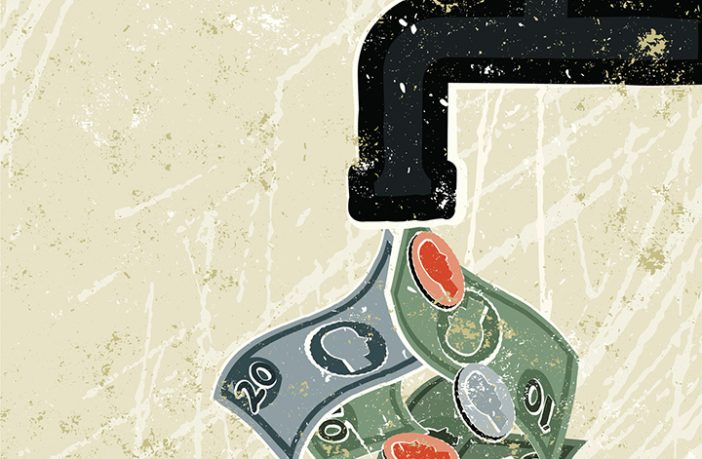A little talked about byproduct of mass immigration into the United States is the staggering amount of money that leaves the economy every year through remittances. The term “remittance” refers to money that is earned in the United States, but is then transferred to family members, friends, or business associates who live abroad. Most commonly, these transfers originate from foreign-born workers or those U.S. citizens who still have family residing in another country.
A recent study by the Federation for American Immigration Reform (FAIR), found that the United States remits approximately $150 billion to other countries each year. In stark contrast, the U.S. receives only $6.6 billion from other countries, leading to a total “remittance deficit” of nearly $145 billion annually.
FAIR reached this figures by examining the most recent bilateral remittance data released by the World Bank.
Mexico receives the most in remittance payments by far, almost doubling China, the second highest recipient. The “Northern Triangle” of Central America (El Salvador, Guatemala, and Honduras) receive a combined total of more than $16 billion. These three countries rely remittances to the extent that between 10-20 percent of their total GDPs are made up of these payments.
The study also notes that roughly $28 billion in remittances stem from illegal aliens who are currently working in the United States without authorization. Those remittances impact local businesses the hardest because those consumers who send their earnings to other countries obviously decrease the amount they can spend domestically.
Furthermore, it harms state and local governments as well since they will not be receiving the sales or consumption taxes that would result if remittance payments were instead spent in local economies on goods and services. So while those who send a good portion of their paycheck abroad still take part in publicly funded services, like public education, roads and emergency services, they pay less in the sales and excise taxes that commonly fund these programs.
Remittances are almost entirely a net-loss to the U.S. economy. So while the discussion of whether or not money sent abroad by immigrants should be taxed or limited is a highly controversial topic, it’s a fact that the practice leads to billions of dollars leaving the U.S. economy every year. And it is important that the economic impacts of remittances on U.S. citizens be considered when discussing whether or not it’s wise to continually increase the number of foreign-born workers flowing into the United States.





6 Comments
This phenomenon is only one aspect of advancing globalism. It means, among other things, the massive transfer of Third World populations to the developed countries and a massive transfer of wealth from the developed countries to the Third World. The ultimate end is global impoverishment, the end of the nation-state system, and assumption of absolute power by the global elite in response to the disaster that they have created.
The remittance is only the tip of the iceberg. If you check your 1099 instructions you can see who is eligible to be claimed a your dependent. If you claim a nephew or niece etc as a dependent and they are living in the US IRS can demand that you provide proof that you provided over half the support of this individual. On the other hand, The IRS (an agency) in its infinite wisdom has ruled that Mexicans and Canadians can claim dependents living in Mexico or Canada and there is no way to ascertain that you have really even spent one cent on their support but you can still claim them as a dependent and reduce your taxes. IRS has no way of checking the validity of your claim.
Odd they come here to work & send money home, vs IF legit, getting them IN. Odd.
Ya Gotta Read The New Dean Koontz Book Called “The Night Window” Just Released This Week
Read the previous 4 novels too, they’re all great depictions of reality in a fiction plot.
It describes the LA area as it is , a 3rd world country full of filth, drug needles and illegal alien OVERPOPULATION homelessness wild fire pollution. Let’s put it this way; Koontz and me agree on “exposing the truth” and no gloss over either. Hades, he depicts Jane Hawke [the beautiful rogue FBI agent who quit when her agency as it went bad], now the Deep State wants her down….in one scene she’s peering through a LA restaurant window watching a homeless man defecating in public….it doesn’t sound like America at all. We’ve got to build the WALL now.
A great read…get it.
Tucker Carlson has been running a series of reports on the socialist utopias of the west cost, including San Francisco and Los Angeles. Apparently the media in those cities are being forced to address the problems.
From NBCLosAngeles.com: “Rat infested piles of rotting garbage left uncollected by the city of Los Angeles, even after promises to clean it up, are fueling concerns about a new epidemic after last year’s record number of flea borne typhus cases.” Nor are these just in low income areas, but the heart of downtown.
The Golden State, everything liberals insist we should aspire to be like. Endless homeless encampments on one side of the street and endless piles of rotting garbage on the other. And this is all on them. They run the state and big cities completely. No money to pick up garbage piles covered with rats but always money for one more social programs for illegals. If there is a blueprint on what the left will do to this country, it’s California.
coast not cost